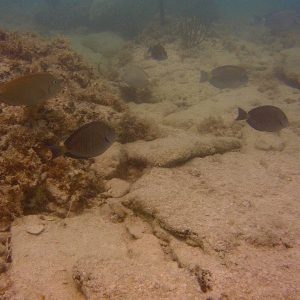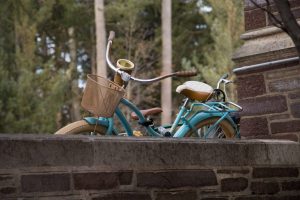And what is classroom learning good for, anyways?
It is Tuesday morning. From the back of the classroom, I squint at the pictures of fish being projected on the board, and scribble in a spiral notebook. Queen angelfish: yellow ring on head, I write as the instructor describes the species’ habitat. She flips to the next slide. Townsend angelfish, I write, less common.

Slipping into the room, with its rows of desks, overhead projector, and professorial monologue – had felt like donning my own old, well-worn clothes. Sixteen years of traditional education have made this role as a student a familiar one.
Yet this time, the circumstances are unusual, and entering the room as a pupil feels suddenly bizarre. It is mid-June, my third week on the island of Bermuda. Just down the hill from this classroom, the turquoise ocean plays against the research station dock. I am at the Bermuda Institute of Ocean Sciences to conduct a field research project assessing how polluted groundwater affects the chemistry and ecology of near-shore coral reefs. Over breakfast, someone had mentioned that a summer course instructor would be lecturing her class on fish identification today. I have been planning to conduct fish surveys on the coral reefs I am studying, but (rather critically) first need to learn to identify all the fish. The timing of the lecture couldn’t be more perfect, so here I am: hunched over a table in the very back of the classroom, listening and scribbling notes like my thesis depends on it.
“There’s a quiz tomorrow,” the instructor announces.
I realized then how thoroughly my independent research differed from this traditional educational setting. I would be taking my own quiz the next day: jumping in the water at my field sites and conducting my first fish surveys of the summer. Rather than studying to meet an instructor’s criteria, I was learning for an immediate, personal purpose.
If my thesis is meant to be the capstone of my education at Princeton, why does it feel so different than everything else I’ve been doing all this time?
I started to wonder: why is research so different from classroom learning? If my thesis is meant to be the capstone of my education at Princeton, why does it feel so different than everything else I’ve been doing all this time?
Traditional education certainly has its benefits as a proven, effective method of transferring knowledge. An expert establishes what is important to learn. Readings and resources are laid out like a well-planned feast. We internalize the material and, when we do so, receive positive reinforcement. It is an addictive game. The reward, depending on your personal educational philosophy, is internal satisfaction, useful knowledge, external recognition, or a grade.
But, from elementary school to Princeton’s halls, this system of traditional coursework cultivates skills that are different from – and sometimes diametrically opposite to – those which we need in research. Unlike research, problem sets and exams tend to have right and wrong answers and concrete end-points. In the majority of lab classes at Princeton, we are asked to follow established procedures – if we do the lab right, we get the right answer. If only research were so simple!
Perhaps most critically, coursework demands that we follow a curriculum rather than chase our own interests. Yun-Yun Li ’17 spoke insightfully on this topic when it came up, tangentially, in a conversation earlier this semester. “As a student, you have to be obedient,” she reflected. “You have to suppress your own interests in favor of time management, or the agenda your professor has. There’s nothing wrong with any of those things, but they’re not the same skill-set as research: problem-solving, thinking on the fly, starting each day with a completely open mind.”
This skillset gap between coursework and research is particularly concerning because research is a lot like life. Learning to follow our passions, to set goals for ourselves that are both exciting and attainable, and then to hold ourselves accountable to achieving those goals, are essential skills in both research and in a career.

So what are we doing in class?
Coursework is a bit like the training wheels on a bicycle. It provides structure as we cover the fundamentals, so that eventually we can ride off without their guidance, learning independently. This is how I am beginning to feel as I prepare for my last two Princeton courses, and put more and more time and energy into my research. The training wheels – the syllabi, the problem sets, the assigned readings – are almost behind me now, and I am headed off, wobbling a little, into the wide, wonderful world.
I remember learning to ride a bike by rattling back and forth down our street, on the same rickety training wheels that my big brother had used. I was the six-year-old speedster of the neighborhood, on four clanking wheels. But when the training wheels came off, it was entirely different. I distinctly remember immediately falling off the bike, landing with a tumble in a bush by the garage. I had learned to pedal and steer and brake, but the training wheels hadn’t trained me to balance at all. I couldn’t learn that until they were off, and then I had to learn to balance, the only way possible: with my best semblance of confidence, full speed ahead.
I remember a similar moment in my research, too. My first summer doing my own project, simultaneously designing a sampling plan and wrapping my head around a whole new body of literature, I felt utterly unprepared to charge full speed ahead. Fifteen years of coursework had taught me the fundamentals of chemistry, biology, evolution, and ecology. It had taught me to read and synthesize academic papers and understand data. But in beginning my own research, taking the training wheels off, I had to learn a whole new skillset: how to make my way, with my best semblance of confidence, through unchartered territory.
Back in the classroom at the Bermuda Institute of Ocean Sciences, the class leaves for lunch. I overhear a few students making plans to study together that evening.
But I thank the professor, pack up my notes with my snorkel gear, and head to the field. There are fish to count.
— Zoe Sims, Natural Sciences Correspondent

